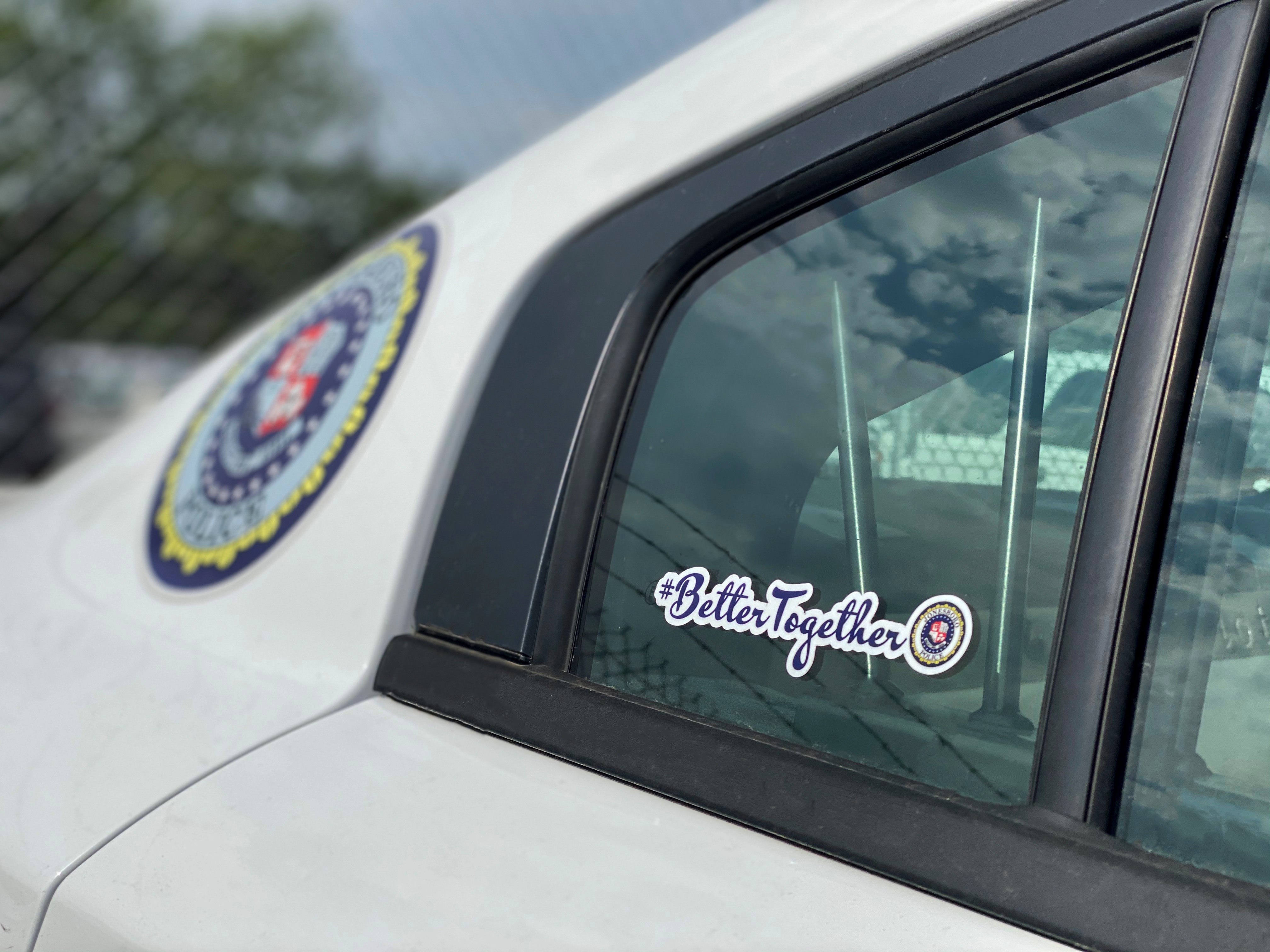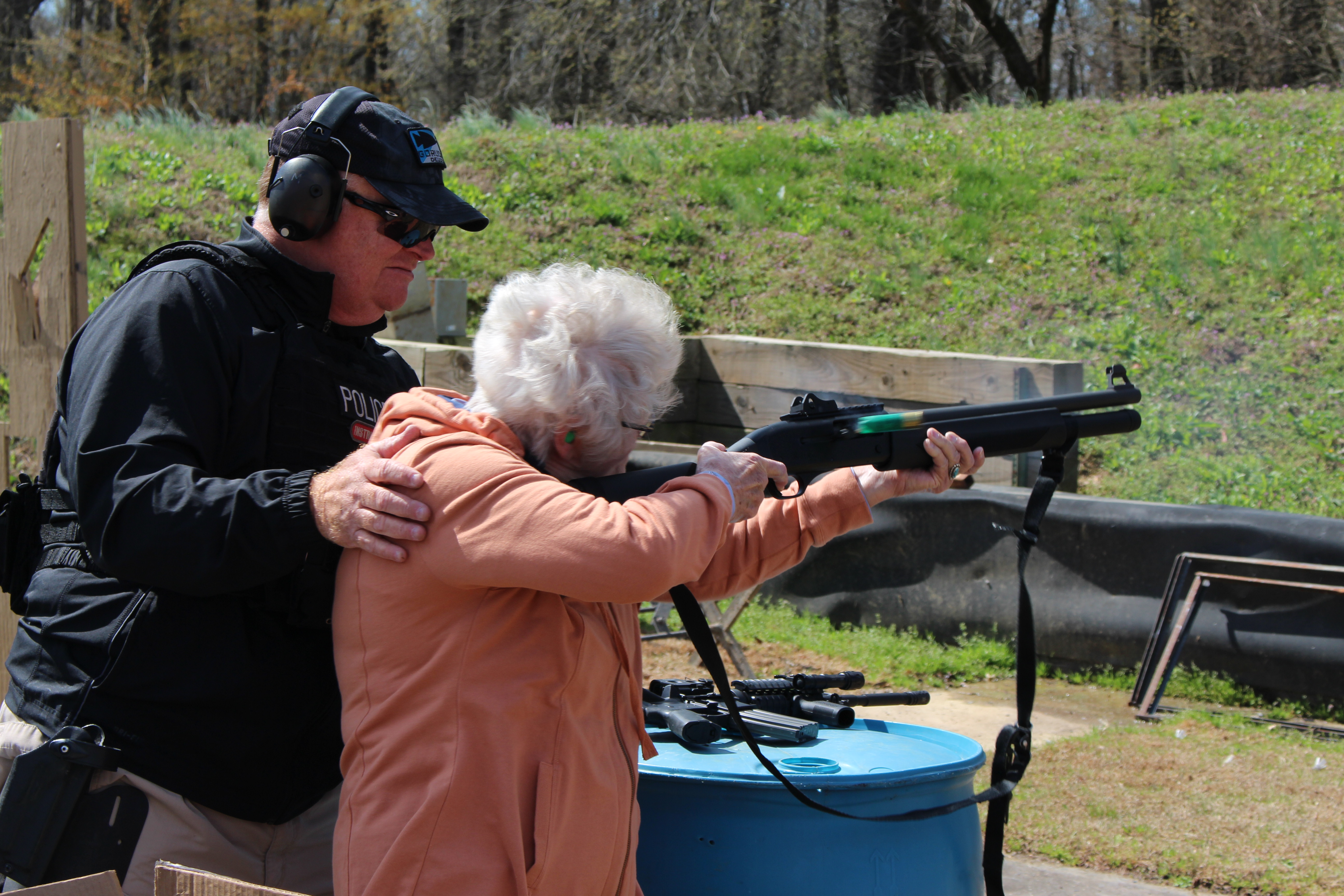Contact Us
To provide feedback on the Community Policing Dispatch, e-mail the editorial board at CPDispatch@usdoj.gov.
To obtain details on COPS Office programs, publications, and resources, contact the COPS Office Response Center at 800-421-6770 or AskCopsRC@usdoj.gov

U.S. Department of Justice
Office of Community Oriented Policing Services
Washington, DC 20530
Beginning on May 31, 2020, Jonesboro, Arkansas, was the location of several protest marches following the murder of George Floyd.
To maintain order while supporting the marchers’ First Amendment rights to freedom of speech and assembly, the Jonesboro Police Department (JPD) assigned officers to block traffic from their route and keep onlookers off the street.
 In a show of support for their efforts, Corporal Blake Anderson, one of the officers assigned to helping the marchers stay safe, raised his fist for a young woman in cap and gown. Asked about his gesture, Anderson, who now works in IT for a private company, said “I’m glad that I could represent the JPD in the photo and during the march. I was unhappy about the bad rap that all officers got after the George Floyd incident. People lumped us all together, and it made law enforcement as a whole look bad. But we aren’t all like that at all, and I wanted to show that.”
In a show of support for their efforts, Corporal Blake Anderson, one of the officers assigned to helping the marchers stay safe, raised his fist for a young woman in cap and gown. Asked about his gesture, Anderson, who now works in IT for a private company, said “I’m glad that I could represent the JPD in the photo and during the march. I was unhappy about the bad rap that all officers got after the George Floyd incident. People lumped us all together, and it made law enforcement as a whole look bad. But we aren’t all like that at all, and I wanted to show that.”
Added Rachel Carmack, the JPD patrolman and Digital Media Officer who submitted the photo, “It reflects the message we wanted to convey to our community before, during, and after the protests.”
Keeping the Conversations Going with Students and Other Community Groups
“Our agency works hard to embrace a philosophy of community policing. We took this opportunity to engage with those marching and have serious conversations about their concerns. In the days following the march, we continued those conversations, and JPD is still working to keep communication ongoing.”
 A medium-sized agency serving a population of approximately 75,000 people, the JPD is located in the cultural and economic hub of Northeast Arkansas, which is also the home of Arkansas State University. Though it has no specifically dedicated unit, community policing is a guiding principle in the department, as reflected in their slogan: #BetterTogether.
A medium-sized agency serving a population of approximately 75,000 people, the JPD is located in the cultural and economic hub of Northeast Arkansas, which is also the home of Arkansas State University. Though it has no specifically dedicated unit, community policing is a guiding principle in the department, as reflected in their slogan: #BetterTogether.
Emphasizing how important it has been to the JPD’s ability to maintain public safety, Assistant Chief Lynn Waterworth said that community relations are better now than when she entered the department in 1988. “I feel the difference, even in how people now raise their children to trust law enforcement, to understand that we are here to support their safety.”
To build this trust, one of the first things Rick Elliott did when he became chief in 2016 was ask KLEK, a minority-owned radio station, if he could go on the air to ask listeners to call in and talk to him about anything that concerned them. He started doing this on a monthly basis, then asked others from the department to do it too.
On the Radio, Facebook, and their Website
“Not only do people call in,” says Waterworth, “[but] we’re also live on air with a video on Facebook at the same time. And we talk about everything. Another female officer and I went on air during women’s history month, and Black officers have gone on during Black History month as well as during the protests about George Floyd’s death. Sometimes people ask questions we can’t answer at the time, but we realize they have a concern and say we will get back to them. If it’s important to them, it’s important to us. We don’t ever push anything off the table.”
Two of the most frequent questions are about excessive use of force and how to make a complaint to the department. Recruiting is a popular topic too.
Says Assistant Chief Waterworth, “Applicants want reassurance that they won’t have too much trouble meeting our requirements. We say don’t let anything hold you back—everybody has a history, and some things are not actually obstacles.”
Relationships with all parts of the community are very important to the JPD. Its officers often speak with students at Arkansas State University on subjects such as sexual assault and meet with other groups to discuss topics that concern them as well.
“We have a big international student base here, and a small Islamic population as well,” says Assistant Chief Waterworth. We’ve grown our relationships with the imam at the local mosque and with other religious leaders too.” Some of the JPD’s command staff also participate in question and answer panels at the Hispanic Community Center.
Dispelling Misconceptions and Correcting False Narratives
One of the JPD programs she’s most proud of is the Citizen Police Academy, created to educate community members about police policies, functions, and services. Giving the public a working knowledge of the department helps to dispel misconceptions about police and how they function. It also encourages partnerships that can enable community-led problem solving and create an environment for positive interaction.
 Since it began in 2015, the JPD Citizen Police Academy has graduated more than 300 community members from the program.
Since it began in 2015, the JPD Citizen Police Academy has graduated more than 300 community members from the program.
Another program that has brought the department and community closer is their social media outreach. “We use it to ask for help and as well as to message the community. Instead of sending out press releases, we go straight to our Facebook page and send the news, alerts, public service announcements, or anything else, straight to our citizens. We have over 40,000 followers now and have seen a huge change in our relationship with the public.”
Assistant Chief Waterworth says body-worn cameras have also been very helpful in both improving policing procedures and building trust in the community.
“Transparency and accountability are very important to us, so we gave up some things to afford equipping our officers with body cameras. We have a very robust review system and on a monthly basis, every supervisor reviews random videos of people in their department as well as all videos of felony arrests or use of force. This has not only helped correct false narratives about some incidents but [also] helped us identify training issues.”
The department also encourages personal interaction. “You’ve got to make connections in the neighborhood. Police presence should involve more than arresting, it should engage people in conversation and establish relationships, so they will call us when something is going on.”
Cleaning Up Litter and Helping Any Way They Can
An effort that literally got the department out on the streets was a littering clean-up campaign. “We had a tornado, then large snowstorms, and when the dust settled and snow cleared out, there was trash everywhere. So we organized a litter campaign with the sanitation, parks department, and other agencies and went to work. It showed we really care about the community, this place we call home.”
That’s what community policing is all about. “It’s more than just building trust and exhibiting transparency, it is about letting our community know that we hear and support them,” said Officer Carmack.
As Anderson said about the marchers, “We strive to protect the freedoms of all individuals, want to listen when they are hurting, and help when we can. As [the] JPD has always said, we are #BetterTogether.”
Faye C. Elkins
Sr. Technical Writer
COPS Office
All photos courtesy of the Jonesboro Police Department.
Subscribe to Email Updates
To sign up for monthly updates or to access your subscriber preferences, please enter your email address in the Subscribe box.






